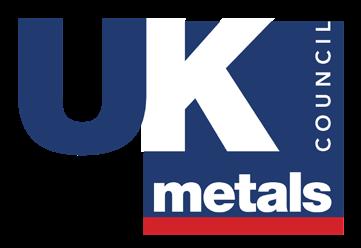

STATE OF THE METALS INDUSTRY IN THE UK


Who are the UK Metals Council?
The UK Metals Council (UKMC) comprises business leaders from across the full spectrum of the metals supply chain, from primary manufacturing through to recycling. The UKMC is committed to promoting and enhancing the profile of the UK metals sector. Its vision is that a modern, sustainable and progressive UK metals industry will continue to supply high-quality, innovative and competitive products to UK manufacturing and infrastructure projects, as a key part of the circular economy for metals.
A key element in achieving this vision is the UKMC’s relationship with the UK Government. The UKMC is recognised as the Sector Council, fulfilling a crucial role in supporting policy development through the coordination of responses from across the whole of the metals sector.
This role has catalysed an annual survey of the current condition of the UK metals industry, recognised as the best method to ensure this report reflects the industry’s views. UKMC will use the findings of this latest report to support the UK Government in both developing policies that protect the industry from the challenges it faces and on issues that are of concern/detrimental to the metals supply chain – with the ultimate aim of enabling the supply chain to take full advantage of growth opportunities.
Purpose of the Report
The aim of this report is to provide a cross-sector overview of the challenges faced by the UK metals industry and its supply chain, as well as exploring prospects for future growth and sustainability.
The report is based on a survey carried out by the UKMC, the largest undertaken across the industry, seeking out contributions from expert and knowledgeable decision-makers, who reflect the interests of every stage in the supply chain.
Reaching out in this way enables the survey to reveal significant trends, identify key issues and highlight growth opportunities for the industry.
Survey responses have been aggregated and anonymised to encourage frank participation and maintain participant privacy.
Foreword
The overwhelming sentiment in the UK Metal Council’s second State of the UK Metals Industry report is ‘resilience’.
Our sector, which features more than 11,500 companies and nearly a million employees, continues to feel the effects of global uncertainty, political instability at home and the difficult cocktail of high energy costs, inflation and interest rates.
Despite all this, more than 50% of firms questioned said they were optimistic about future prospects.
This is reflected in what I have seen on the ground during factory visits and at industry events, where UK businesses continue to demonstrate world class manufacturing, a thirst for collaboration and innovation in the face of the never-ending challenges of change.
Our report is the most detailed annual overview of the UK Metals industry, based exclusively on feedback from across all levels of the manufacturing supply chain, covering SMEs, OEMs and Primes.
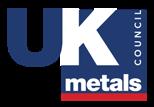

This depth of analysis can only be possible with the ongoing support of our 13-member trade associations, who have promoted the survey across their members for us to gain the most up-to-date insight into life in our industry.
Encouragingly, we received many more responses and comments this year than last, giving us more comprehensive data and insight on topics ranging from business performance and European trade to Net Zero, the Circular Economy and Skills.
This intelligence will be used to lobby the new Labour government and strategic stakeholders on some of the key ‘asks’ from our sector and what companies need to maintain global competitiveness.
This year the UK Metals Council is going one step further and, as you will read in later pages, we have come up with six key priorities that we want to pursue in partnership with UK Government.
Our wish list covers anything from effective policies to stabilise and encourage clean energy production, to apprenticeship levy reforms and providing support and resources to help smooth trade with our continental neighbours.
There are also a host of regulatory initiatives that need to be addressed, with the most challenging the Carbon Border Adjustment Mechanism.
CBAM is EU-driven legislation that is already in place, with the UK now playing catch-up with its own version. While protection from low-cost and high emission competitors is crucial to UK metals manufacturing, we must recognise that many of our members function in global supply chains and markets. We really need to ensure that UK regulation is balanced and takes full account of the needs and challenges of all segments of the metals supply chain, and does not become an unnecessary and costly burden on its members.
All these requests should be co-ordinated by the overdue appointment of a Minister for Manufacturing, which 60% of report respondents would heartily welcome. We need to ensure the office-holder is from industry and, importantly, understands that the sector is not just about the ‘big boys’, because policy and legalisation invariably impacts disproportionally on SMEs.
The State of the UK Metals Industry 2024/25 will be officially unveiled at this year’s UK Metals Expo in September, the only domestic metals-focused exhibition.
It brings our sector together and is a melting pot for new ideas, learning, networking and raising awareness of the breadth and depth of the wonderfully diverse and world class supply chain we have in the UK.
Thank you
I am approaching the final weeks of my two-year stewardship of the UK Metals Council.
Despite working in manufacturing for more than three decades, I have still been surprised by the sheer depth of ‘metals’ talent we have in this country and the appetite to embrace new material innovations, the circular economy (with the right support) and to succeed in the face of a myriad of challenges – the majority often out of their control.
In my tenure, we have grown trade association membership and involvement, lobbied the Government on key issues and raised the sector’s profile through a stronger media presence.
My best wishes to my successor, who has a tough but fascinating challenge ahead of them. Even though I will not be Chair anymore, I will still be telling everyone I meet that we all touch metals every day, be that in our homes and in the services we all use, in the cars, planes and trains we travel in, in the medical devices we rely on, as well as all the tools and machinery used for their production.
And now it is recognised that metals can be infinitely and readily recycled into new parts, we need to value metals even more!
Rachel Eade MBE Chairperson
UK
Metals Council
UKMC MEMBER ORGANISATIONS



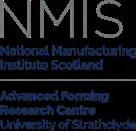







Executive Summary
This report provides a snapshot of the UK metals industry, identifying both opportunities for sustainable growth and the challenges that need to be overcome to achieve this growth, through collaboration and partnership with the UK Government. The information for the report has been collated from an industry-wide survey of expert and knowledgeable decision-makers.
Outlook for the Industry
This year’s survey highlights the impact of both domestic and international uncertainty on the metals sector. Positive sentiment for prospects over the coming twelve months has declined year on year, although it should be noted that the survey was conducted during the run-up to the 2024 UK general election, a period of uncertainty for all UK businesses. Nevertheless, the results of the survey, very clearly reveals the resilience and determination of the UK metals sector, whatever the geopolitical environment.
UKMC now looks forward to working closely with the new Government to forge a clear UK industrial strategy that will reenergise a sector which is crucial to the prosperity of the British economy.
International Trade
Last year’s survey identified the increased challenges of trading with the EU. Those challenges have eased – primarily, the survey suggests, as metals companies have adapted to the new trading conditions. Nevertheless, the metals supply chain continues to encounter substantially greater administrative burdens moving goods into and out of the UK. Regulatory compliance also continues to escalate, notably following the EU introduction of its Carbon Border Adjustment Mechanism.
The survey shows that companies continue to seek new international markets and partnerships, although only a fifth have diversified activities to mitigate the effects of leaving the EU. The additional costs and complications of trade with our nearest and largest market, therefore, continue to dominate concerns.
The sector will continue to look for support from the UK Government to smooth European trading relationships while continuing to provide support in accessing global markets.
Raw Material Supply
Only a small minority (14%) of respondents in this year’s survey noted challenges with raw material supply, a substantial improvement on the caution expressed in 2023. A quarter of 2024 participants were positive about availability and the balance satisfied with supply conditions. A combination of collaboration with existing suppliers, diversification to new sources and risk management strategies have been adopted to ensure consistent supply.
Energy costs and Net Zero
Energy remains a major concern for a sector in which many participants are high energy consumers. More than half of respondents are deeply concerned about fluctuating energy market conditions, exacerbated by continued reliance on fossil fuels, and leading to difficulty in accurately forecasting energy costs.
Companies are proactive in mitigating the cost impact of energy on their businesses, with more than half investing in energy efficient technologies and a third modifying production processes to reduce consumption. A quarter are also investing in renewable energy, clearly demonstrating the sectors’ commitment to the Net Zero journey.
UK investment in clean energy production is emphatically seen as the most important policy to reduce costs and promote sustainability. Renewable energy incentives and tax incentives would also greatly assist the metals sector.
Metal companies clearly understand the concepts of Net Zero and the Circular Economy. However, more than 60% of companies see a major challenge in balancing the financial costs of low-carbon technologies. Close to half face similar challenges in reducing emissions in operations and supply chains, and in implementing suitable renewable energy sources. There are similar concerns over the high cost of implementing circular economy practices, with progress impeded by a limited recycling infrastructure and difficulties in sourcing recycled inputs for production.
Skills and employment
Recruiting the many crucial skills required in the metals sector continues to be a major challenge, as are the escalating costs of both recruitment and retention. Close to 60% of respondents report difficulty in attracting candidates with the right skills, from a very limited pool of qualified candidates. These challenges and intense competition for good candidates mean that close to 80% of companies identify providing competitive salaries and benefits as crucial to attract and retain the right people. Around half of companies also focus on provision of professional development and career growth, as well as employee recognition and rewards, with more than half stressing the importance of a strong organisational culture.
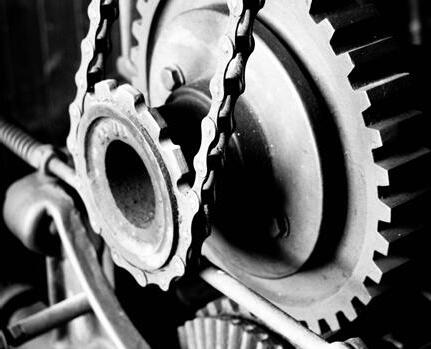
These efforts need to be complemented by Government action to plug the skills gap and ensure manufacturing is recognised as an attractive career choice.
The new Government’s recognition that the skills shortage is a crucial issue for British manufacturing. An industry-engaged review of the Apprenticeship Levy and eligibility of learning for funding should now be a priority, so that the Skills England Bill may provide the platform for a transformation in the UK skills pipeline.
Conclusions and Next Steps
The UK Metals Industry continues to demonstrate its health and resilience, with half of respondents having expressed optimism about the future of the sector, despite the survey being conducted in a particularly uncertain period.
Metals businesses continue to demonstrate high levels of self-reliance, taking positive action to overcome the challenges they face. However, there are distinct areas where additional Government support is required.
The UK Metals Council seeks a renewed partnership with UK Government to:
▪ Commit to a Minister for Manufacturing, to coalesce all Government activity to the support of British manufacturing and processing.
▪ Develop effective policies to protect industry from energy price volatility through long term investment in clean energy production infrastructure. Support energy efficiency and innovation to ensure global competitiveness.
▪Provide support and resources to smooth trading with our continental neighbours and negotiate balanced trade partnerships worldwide.
▪ Recognise the importance of critical raw materials and the benefits of the circular economy and recycling in the UK, including the role the domestic metals industry plays.
▪ Ensure regulatory and legislative initiatives take account of the impact at all business levels but particularly SMEs.
▪ Engage with industry to review the Apprenticeship Levy and eligibility of learning for funding. Work with education and training providers to address the skills gap faced by the industry and win recognition it is an attractive career choice for young people.
Who completed the survey?
The survey participants covered 11 different primary job functions, with close to half holding a leadership function. 93% of respondents described having management responsibility within their company, whether as an owner, board member or executive, or holding management/head of department responsibility.
This preponderance of senior roles indicates the participants possess a substantive level of expertise and knowledge to inform the insights they have provided in their survey responses.
Company roles in the metals supply chain?
Survey responses were received from twelve defined segments of the metals supply chain, with 11% opting for ‘Other’. Nearly 30% described their company operating as an End User Manufacturer, followed by 25% operating in Metal Processing/Fabrication. Other well represented areas included Metal Distribution, Treatment and Finishing, Recycling, and Engineering and Design.
Strong representation across these segments ensures the survey is reflective of the entire metals supply chain.
Market Sectors in which respondents operate?
While a wide range of market sectors are represented, the largest was Construction & Infrastructure selected by 60% of respondents, followed by Automotive selected by half of respondents. While distribution across market sectors is broadly similar to last year’s survey, Energy is more strongly represented this year, with 43% now engaging in this market.
The survey reveals that companies service more than one sector, in many cases engaging in more than four sectors. Companies involved in Refining, Mining and Metal Distribution, as well as Recycling, naturally service a broad range of sectors. While some metal processing and manufacturing companies are highly specialised, others avoid over reliance on one sector to mitigate risk and to capitalise on more diverse growth opportunities.
What
best describes your overall sentiment for the next 12 months?

While nearly half of respondents said they were somewhat or very positive about business prospects over the coming year, this represented a significant decline in optimism compared with last year’s figure of 70%. Moreover, the proportion saying they felt very optimistic has fallen from 26% to marginally over 7%. Similarly, those feeling less positive about future prospects in this year’s survey totalled slight over 27%, compared with 16% last year. That said, the proportion expressing a high level of pessimism was largely unchanged.
It should be noted that the survey was conducted immediately prior to the UK General Election, a period of significant uncertainty for all businesses.
Which factors contribute to optimism about the future of your business?
Optimism about prospects was driven by five key factors. All reflect the metal supply industry’s longterm resilience and commitment to efficiency and reliability. Strong customer loyalty and satisfaction ranked highest at close to 19%, followed by strong market demand for company products, underpinned by effective cost management and operational efficiency. The significance of expansion into new market or customer segments indicates that metal supply businesses are not standing still and waiting for economic recovery, with many continuing to be positive about industry trends and growth opportunities.
The survey suggests there is greater opportunity for product and service innovation in the industry. It also demonstrates relatively low current confidence in access to funding or investment, likely to be an inhibitor to both innovation and engaging with new market opportunities.
What are the most significant challenges your organisation currently faces?
Last year’s survey clearly signalled a high level of concern over the effects of the UK leaving the European Union as well as the soaring cost of energy. This year these concerns have diminished although rising operating costs, significantly also including wages, ranks fifth amongst the challenges. Top of the rankings is economic uncertainty and market volatility as it was in 2023, with global concerns accentuated by the impending UK general election. Concerns over regulatory burdens and compliance requirements have increased markedly to rank second, with indications these are now more strongly related to domestic policy.
Access to finance and funding opportunities has also become a greater concern, as companies prepare for recovery and seek new opportunities. Talent acquisition and retention continues to be a significant worry for the industry. Concerns over raw material costs have diminished year on year.
The survey shows that adopting sustainable practices remains a lower priority. The industry also appears not to be placing a high priority on digital transformation yet.
9.92% Economic uncertainty and market volatility
8.19%
4.12%
2.27%
What challenges do you continue to face as a result of the UK leaving EU?
Responses to the previous question show that concerns over the implications of leaving the EU, while not disappearing, have significantly diminished. The effect of new border controls and the impact of tariffs and other additional costs dominate concerns. There are continued impacts on supply chains and logistics and uncertainty in market conditions. Regulatory compliance remains a significant concern, likely to have been accentuated by the EU introduction of its Carbon Border Adjustment Mechanism, which is impacting UK exporters to the continent.
How has your business responded or adapted to the new and emerging
trade
challenges ?
More than a quarter of respondents are seeking new international markets or partnerships, with around a fifth diversifying business activities to mitigate the effect of leaving the EU. Somewhat fewer are exploring opportunities from new trade agreements.
Overall, however, the survey indicates that adaptation is a higher priority, through adjusting supply chain strategies and updating contractual agreements. The role of industry associations in providing information and support is also evident, with approaching a third of respondents confirming collaboration with their trade body.
56% Adjusting supply chain strategies or sourcing alternatives
28% Seeking new international markets or partnerships
20% Investing in technology or systems to improve customs and trade processes
16% Exploring opportunities arising from new trade agreements or regulations
30% Collaborating with industry associations or government agencies for support
22% Reviewing and updating contractual agreements with international partners
20% Diversifying business activities to minimize leaving EU - Related risks
6% Other
Which policy or measure would you like to see implemented to support businesses in navigating the trade challenges and international relations?
The survey clearly indicates there is no policy ‘silver bullet’ to ease trade challenges, but rather a range of measures, headed by enhanced government support and resources, together with the need for greater coherency between government departments. Despite indications a relatively low proportion of respondents are currently looking to gain from new trade agreements, development of new partnerships is seen as one of the highest support priorities.
Emphasis on provision of financial incentives or promotion of skills development ranks somewhat lower – indicative perhaps that the sector has had limited confidence in government provision of either and has, therefore, become more self-reliant. Hopefully, the new UK government’s commitment to skills development will materialise into more substantial support.
20% Enhanced government support and resources for businesses to navigate trade barriers and customs procedures
20% Strengthened collaboration and coordination between government agencies and industry stakeholders to address emerging challenges
19% Development of new trade agreements or trade partnerships to expand market access
14% Promotion of skills development and training programs to ensure businesses have the necessary expertise to navigate international markets
12% Increased investment in infrastructure and logistics to improve supply chain efficiency
10% Provision of financial incentives or grants to support businesses in adapting to new regulations and requirements
5% Other
What are the main challenges in the supply of raw materials?
Price volatility continues to be the dominant challenge, with concerns over supply chain disruptions and limited supplier options significant contributing factors. Quality control issues are the least critical factor, with only around 17% of respondents highlighting concerns here. Environmental regulations and geopolitical factors, on the other hand, are a concern to more than a quarter of respondents.
How are you mitigating or addressing raw materials challenges?
Diversifying suppliers or sourcing regions
Two strategies are being adopted by more than half of companies. 52% of respondents are collaborating with existing suppliers to forge long term partnerships. Slightly more say they are diversifying suppliers or sourcing regions. For many respondents these strategies are obviously complementary rather than contradictory. Investment in raw material options is more limited, likely to be curtailed by opportunities. However, more than a fifth of respondents are implementing risk management strategies and/or enhancing visibility and traceability to strengthen supply chain resilience.
Here again, industrial associations are playing a significant role in supporting their members in addressing supply chain challenges.
The survey suggests that the sector sees engaging in sustainable sourcing as a relatively low priority.
Current availability of raw materials?
The survey indicates that raw material supply is not currently proving a major challenge for the industry, with only 12% of respondents flagging any limits to availability.
This reflects a substantial improvement on the 2023 survey, in which 31% of companies reported limited availability.
Around a quarter of participants now report abundant or excellent availability, with the majority rating it as moderate.
The major challenges regarding energy costs?
Metals industry companies are in many instances high energy consumers, so have incurred radically increased costs over recent years – a challenge highlighted by 46% of survey participants. An even greater challenge, identified by more than half of survey respondents, is fluctuating energy market conditions, with 29% noting their dependence on fossil fuels and associated price volatility. A quarter of respondents say these factors present difficulties in accurately forecasting energy expenses and more than a fifth have limited access to affordable and reliable energy sources.
The survey clearly identifies that energy costs will continue to be a major concern for the sector – likely to impede the ability to invest and grow, unless addressed effectively to provide longer-term stability and support for investment in green energy sources.
How are you addressing high energy costs?
More than half of companies are investing in energy-efficient technologies and equipment to mitigate the impact of high energy costs. Around one-third are also modifying production processes to reduce energy consumption and a quarter are investing in renewable energy. Half of respondents have also sought improved energy contracts.
To inform these decisions and identify improvements, a quarter of companies have carried out energy audits, with some collaborating with peers to obtain improvements and a smaller number, around 6%, participating in energy conservation programs.
Which policies are favoured to reduce energy costs and promoting sustainability?
Investment in infrastructure for clean energy production was emphatically identified as the best energy policy to reduce costs and promote sustainability.
A quarter of respondents also favour renewable energy subsidies and incentives and around 14% want tax incentives for energy-efficiency technologies.
Energy efficiency regulation met with very limited support and a cap and trade system for carbon emissions with close to none.
Major challenges transitioning towards Net Zero?
Unsurprisingly, more than 85% of respondents said they were familiar or very familiar with the concept of Net Zero. However, recognition of concept and translation into practice are very different things.
61% of respondents identify the major challenge in transitioning to Net Zero as balancing the financial costs of low-carbon technologies. Reducing greenhouse gas emissions in operations and supply chains is a focus for close to half of companies. This, however, presents evident challenges in accessing reliable data on installations’ carbon footprints, then identifying and implementing suitable renewable energy sources, and adapting infrastructure and processes for sustainability.
Concerns were also expressed over managing stakeholder and key customer expectations and overcoming regulatory barriers.
61% Balancing financial costs of low-carbon technologies
39% Identifying and implementing suitable renewable energy sources
30% Accessing reliable data on carbon footprints and emissions
21% Addressing skills and knowledge gap in sustainable practices
16% Managing stakeholder expectations and communications
47% Reducing greenhouse gas emissions in operations and supply chains
30% Accessing reliable data on carbon footprints and emissions
28% Adapting infrastructure and processes for sustainability
21% Overcoming regulatory barriers or policy limitations
6% Other
Addressing the challenges of achieving Net Zero?
40% of respondents recognise the importance of setting clear sustainability goals, with a slightly higher proportion investing in renewable energy generation and efficiency measures. A third of respondents also identified the importance of adopting low-carbon technologies and practices.
The benefits of collaboration with industry peers and partners is well recognised. Participation in sustainability initiatives and certification programs found less favour but was still noted by a quarter of respondents. Stakeholder communication and transparency currently appears to be a lower priority.
is your business or organisation addressing these challenges? What are the major
Half of respondents say they are working with recycling and waste management organisations to support the circular economy, and a third are developing and implementing recycling programs. Around a quarter are incorporating recycled materials in packaging and a similar number are raising awareness about recycling with consumers. Participation in governmentled initiatives is lower, perhaps because of limited opportunities in this sphere.

Similar to understanding of Net Zero, more than three-quarters of participants expressed familiarity with the concept of the circular economy.
When it comes to concerns, high costs in implementing circular economy practices, together with limited infrastructure for recycling and waste management, ranked as two of the highest. Lack of consumer awareness about recycling practices attracted similar attention. At a practical level around a quarter of participants identified limited market demand for recycled products and difficulty in sourcing recycled materials for production. 10%
Developing and implementing recycling programs or initiatives
in partnerships or alliances to promote circular
Only a minority of around a third of respondents consider current activity as effective. 36% deem it somewhat or very ineffective, with around a third expressing neutrality.
Given the industry’s pressing recruitment and retention needs for skilled labour this must be recognised as a major issue.
What
recruiting and attracting labour?
Limited pool of qualified candidates
Difficulty in attracting candidates with specialised skills or expertise 38%
Intense competition from other companies for top talent 15%
Lack of employer brand awareness or positive reputation in the industry 11% Issues with sourcing and utilising effective recruitment channels 11% Other 4%
Lengthy recruitment budget or resources
The overwhelming majority of respondents – more than two-thirds – identify the biggest challenge as being the limited pool of qualified candidates, with 59% experiencing particular difficulty in attracting candidates with specialised skills. 38% also say they experience intense competition for top talent. Around 15% imply that greater brand awareness and positive reputation in the industry would assist recruitment. More public awareness of career journeys and opportunities across manufacturing would be welcomed.
Strategies and initiatives to improve talent retention and reduce
Competitive salary & benefits packages
Strong organisational culture and positive work environment
Professional development & career growth opportunies
Flexible work arrangements or remote work options
Employee recognition & rewards programs
Regular performance feedback & coaching
Other
work-life balance initiatives
Three-quarters of companies are providing competitive salaries and benefits packages to attract or retain talent. Other benefits include a strong organisational culture and positive work environment as well as professional development and career opportunities, both identified by approaching half of respondents. Around a third of participants also identified regular performance feedback and coaching, together with a recognition and rewards program as important contributions. Work life balance initiatives attracted significantly less support, probably because working from home is less achievable in a manufacturing environment.
Primary
source of competition faced in the market?
While a third of respondents express concern about domestic competition, 40% identify both international and domestic sources of competition. Domestic competition is inevitably intense. However, the market for metals is global and the survey clearly reflects that the UK continues to be an attractive market for international companies.
What are the challenges posed by your competition?
As would be expected, more than three-quarters of participants identify price as the major competitive force. The strength of international competition makes it critically important that the UK Government takes assertive action to ensure a level playing field for British companies, and also stable and competitive energy costs, to enable them to grow in global markets as well as defend their domestic market share. Product quality and innovation, market saturation and regulatory barriers are all recognised as important but represent single figure concerns.
How can your company address these challenges to maintain competitiveness?
The top strategy for maintaining competitiveness identified by the survey is improving costefficiency through process optimisation and automation. Given survey respondents already identified digital transformation and keeping up with technological advancements as a significant challenge to their businesses, the momentum of this strategy requires companies to have confidence in economic growth, have good access to funding, and a strong pipeline of technical talent.
Half of respondents also say enhancement of product quality and innovation is crucial to maintain competitiveness, with similar needs to ensure momentum.
Neither relocation of production to lower cost countries nor reshoring production to the domestic market are seen as particularly viable strategies.
67% Improve cost-efficiency through process optimisation and automation
50% Enhance product quality and innovation
7% Re-shore production or operations back to your domestic market
5% Relocate production or operations to countries with lower costs
Other
What are your Top 3 asks of Government?
The survey reveals resounding support for a Minister for Manufacturing – topping the ask list with more than 60% of respondents in favour. 54% focused on the need for energy stability and pricing, while more than half of participants want a cross-sector industry strategy.
While these are emphatically the ‘Top 3’ asks, a third of respondents also sought clarity on Net Zero targets, and 40% needed simplification of EU-UK border documentation.
Slightly less than a quarter placed reform of the apprenticeship levy amongst their top three, with 9% looking for help to recruit non-active members of the potential workforce.
51% Cross sector industrial strategy
Have you benefitted from funded projects/grants?
The survey reveals that less than one quarter of respondents have benefited from funded projects/ grants. Throughout the survey, the resilience and self-reliance of the UK metals supply chain has been demonstrated. This question, however, begs serious questions about the accessibility and attractiveness of funded projects or grants, particularly for investment in the net zero journey, in skills and in new export business development. It suggests Government needs to provide far more routes to this type of funding to support British manufacturing growth.
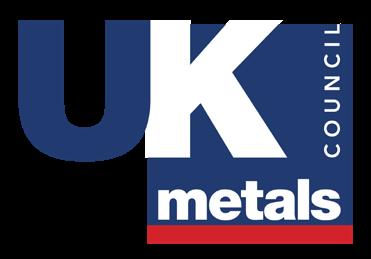
MEMBER ORGANISATIONS


The University of Strathclyde's Advanced Forming Research Centre (AFRC)
About the AFRC
The University of Strathclyde's Advanced Forming Research Centre (AFRC) is a world-leading metallics research centre with a specific focus on metal forming and forging.
We help businesses of all sizes to look at productivity improvements, testing and trialling new technologies and ideas before turning them into a commercial reality. Among our members and partners are some of the world's leading manufacturing firms operating in a range of sectors.

The AFRC is operated by the University of Strathclyde and is part of the High Value Manufacturing (HVM) Catapult. It laid the foundation for the National Manufacturing Institute Scotland (NMIS), which has since expanded to include five centres.
Where we are
The AFRC operates out of a state-of-the-art facility near Glasgow Airport within the Advanced Manufacturing District Scotland (AMIDS),
We now also have an outreach office in the Olympic Legacy Park in Sheffield, helping us provide forging and forming houses in the region with support to boost productivity, overcome production challenges and better compete.
Some of the businesses we work with locally include Abbey Forged Products, Forged Solutions Group, Footprint Tools and Sheffield Forgemasters. We also host regular forming and forging forums convened by the AFRC and attended by businesses large and small within the industry. The sessions include presentations, lively roundtables on relevant issues and opportunities, and time for networking.
Transforming the global forging sector
This year, we officially opened the world's most advanced research and innovation hot forging platform, connecting the $75 billion global forging sector with our Scotland-based team and industryscale testbed no matter where they are.
FutureForge is a world-unique platform for hot forging innovation with advanced industry 4.0 capabilities. It enables companies from overseas to connect in real time with the AFRC remotely and benefit from its people's skills and expertise and ground-breaking R&D equipment.
FutureForge comprises a tri-modal 2,000 tonne press offering open die, closed die, and iso-

thermal forging capabilities, instantaneous data analytics through a state-of-the-art control room, two furnaces: one powered by electricity and the other by gas and a custom-built smart robotics manipulator arm.
The platform provides a safe and secure datarich research arena in which the forging industry can de-risk the development of new products, processes and technologies for easier adoption on the shop floor.
Industry 4.0 forging
Incorporating up to 2,000 data channels –far more than any industrial press should need – the platform facilitates the collection of a vast amount of information, allowing the AFRC team to develop a roadmap for how the data can be best used.
The team is also working on digital twins and simulation tools from the microstructural to component level, and regularly speaking to the furnace and forging press manufacturers to gather additional inputs and fill any gaps needed to create digital passports for parts.

Professor Brad Wynne, director of the Advanced Forming Research Centre, said:
"With the largest hot forging press of its kind, dedicated solely to R&D, unparalleled connectivity capabilities, and over a decade of experience in materials science, the Advanced Forming Research Centre is in a unique position to help the forging industry embrace net-zero, unlock energy savings, accelerate productivity and ultimately transform and secure this vitally important industry for future generations.
"FutureForge will unlock a valuable opportunity for forgers to explore modern processes and new integrated digital technologies that could have a significant impact on global manufacturing.
"We want to help companies push the boundaries of what is currently possible and see the difference that digital science and the smarter use of technology can make to business operations and the sector as a whole.
"By modernising and future-proofing the UK's forging industry, we are helping to make it more competitive and resilient to global challenges such as supply chain issues and rising energy costs, as well as helping to secure jobs for the future by making forging houses safer for workers and ultimately a more attractive career choice."
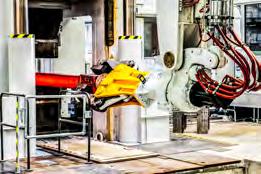
FutureForge is underpinned by the AFRC's worldleading expertise in materials science, and companies using the facilities will also benefit from the wider capabilities of the NMIS Group.
The multi-million-pound investment is supported by the Aerospace Technology Institute (ATI), the High Value Manufacturing (HVM) Catapult and Scottish Enterprise.
Working with the AFRC
There are various ways that you can work with the AFRC and the wider NMIS Group.
Firing up your research and development
Our talented team can advise on ways to unlock funding for R&D projects, find collaboration partners, and explore new technologies and processes that can help you overcome challenges, become more productive and sustainable, and cut costs.
Membership
Membership of the AFRC provides access to our unique set of capabilities, allowing you to take advantage of the facilities and expertise within the centre and work with like-minded people and businesses.
Coming from right across the global manufacturing sector, our Members and Partners include businesses from various industries and are of different specialisms and sizes. They all benefit from links with our world-renowned research centre and include Sheffield Forgemasters, Boeing, Footprint Tools and many more.
Contact us today

The UK Aluminium Federation (ALFED) is proud to be able to use our position as the voice of the UK aluminium industry to promote the UK Metals Council survey out to our members, getting the thoughts and opinions of such a wide representation from across supply chains. This year, following the announcement of the UK general election, ALFED were pleased to launch the UK Aluminium Manifesto; a comprehensive document outlining key stipulations for the next UK Government to prioritise and support the vital role of the aluminium manufacturing and processing sector in driving economic growth, sustainability, and energy security. ALFED is calling upon the UK Government to recognise and champion the vital role of aluminium in shaping the nation’s future. The UK Aluminium Manifesto underscores the significance of aluminium as an affordable, highly recyclable material that supports a global circular economy and forms an essential component of the modern UK economy.
Collaboration and knowledge sharing are high on ALFED’s agenda and for this reason, we host a variety of member networking events throughout the year, including the EnvironmentAl Sustainability Strategy Day, which returning for its 2nd edition at BMA House, London, took on the theme of next steps for the UK aluminium industry as we call on the next UK government to double-down on policies towards net zero emissions. Additionally, we recently hosted this year’s edition of the annual House of Lords Lunch, which not only delved deeper into the launch of the UK Aluminium Manifesto, but also addressed the key theme of building an industrial strategy for the UK aluminium sector. Speakers included ALFED President, Mark Allen (Sales Director of Mechatherm International Ltd), who spoke about his experiences and thoughts on the potential of the industry and the future we stand on the brink of. We also heard from Mike Smith of the International Wrought Copper Council, who introduced the British Back Metals Initiative. Finally, we heard from Seamus Nevin of Make UK, who outlined the stipulations that make up the Maker’s Manifesto, and the need for a comprehensive industrial strategy for the sector.
Later in the year, we will see ALFED exhibit once again at UK Metals Expo at the NEC, Birmingham on the 11th – 12th September, before the annual Business Briefing and Dinner on Thursday 28th November, which will be hosted for the first time at the De Vere Beaumont Estate, Windsor.

Nadine Bloxsome, Chief Executive Officer, ALFED:
“Aluminium
is an affordable, highly recyclable material that supports a global circular economy. As the voice of the UK industry, our mission is to expand the market for aluminium products by helping offer market insight, lobby government and boost their competitiveness”.
Whether it’s providing technical support, delivering market updates, informing trade policy, or offering networking opportunities – everything we do focuses on helping UK aluminium capitalise on opportunities.
As a member, you become part of an influential community, getting your voice heard within the industry and at the highest levels of government. Working together, we’re actively driving UK alu minium forward.
For more information on our services and benefits, please visit: www.alfed.org.uk
ALFED Launches the UK Aluminium Manifesto
As the voice of the UK Aluminium Industry, the Aluminium Federation (ALFED) is calling on the next UK government to prioritise and support the vital role of the aluminium manufacturing and processing sector in driving economic growth, sustainability, and energy security.
Our manifesto outlines clear stipulations for how the new government should regard aluminium manufacturing as a key contributor to the UK economy, including:
1. Deliver an Industrial Strategy Creating a Level Playing Field
A robust industrial strategy is paramount to our nation’s economic success. Manufacturing must lay at the heart of the next Government’s economic agenda, and we recognise the interconnectedness of an industrial strategy with other key policy areas, such as housing and construction. By aligning with sectors like housing, building, and construction, which are significant consumers of aluminium, we can leverage synergies to drive sustainable growth.
2. Safeguarding Energy Security and Net Zero Policies

This includes incentivising investment in aluminium manufacture and product design, harnessing green electricity, and leveraging the UK’s expertise in metals processing.
3. Political and Policy Stability
A return to political and policy stability is essential for fostering an environment conducive to long-term investment and growth. We urge the next Government to prioritise stability and engage in constructive debates to address the critical choices facing the country.
4. Skills Revolution and Education Reform
As part of a comprehensive industrial strategy, we advocate for a skills revolution to equip the current and future workforce with the digital skills necessary for advanced manufacturing. Substantial reforms of the Apprentice Levy and a complete review of the vocational skills system are imperative to ensure a constant pipeline of talent to fuel the expansion of the sector.
5.
Infrastructure
Investment and Net Zero Economy
The next Government must increase infrastructure spending to the OECD average, with a focus on maximising the opportunities of a net-zero economy. This includes investment in transportation, energy, and digital infrastructure to support the growth of the aluminium sector.
Scan the QR code on the top of the previous page to read the full manifesto.
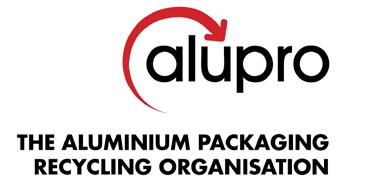
Who are Alupro?
For over 30 years, Alupro has been the voice of the aluminium packaging value chain in the UK.
A membership organisation representing aluminium producers, packaging manufacturers, FMCG brands and recyclers, Alupro’s purpose is to help the industry meet its recycling targets and put the spotlight on the merits of aluminium packaging. Our work revolves around three pillars.
1. Innovation and Representation
We carry out research into consumer behaviour, recycling infrastructure and packaging design for recyclability, working in collaboration with partners and governments to stimulate recycling.
2. Consumer Education & Engagement
Our branded programmes, including Every Can Counts and MetalMatters, engage the public wherever they consume metal packaging to encourage them to always recycle and have a demonstrable success rate at increasing recycling yields.
3. Schools Programme
Our dedicated programmes for Key Stages Two and Three, taught to over 87,000 children in 2023, deliver practical tools for teachers that engage and entertain children whilst they learn the basics of recycling.


Aluminium Packaging & Recycling in the UK
The aluminium packaging market in the UK is the largest in Europe. Every year, the UK public consume over twelve billion aluminium drinks cans, billions of foil trays and screw-tops, millions of aerosols and many other types besides.
Aluminium is the material of choice for many packaging designers due to its unique characteristics, including its amazing recyclability. In a world increasingly focused on achieving a sustainable future, aluminium packaging is well placed to deliver a circular economy. Indeed, our industry has a great starting point with 81% of aluminium beverage cans being recycled in 2023 and 68% of all aluminium packaging as a whole. For context, this is an increase of over 20% across both of these measures in the last 10 years, a fantastic achievement.
The success of this industry, growing by double-digit percentage points over the last decade, supports tens of thousands of jobs across the UK value chain.
Challenges
Like all responsible industries, ours is committed to improving sustainability still further (primarily through decarbonisation) and maximising the availability of recycled material for use in new products. Alupro’s members are facing challenges to achieving these goals.
Recycling aluminium, although much less energy-intensive than creating primary aluminium, uses a lot of thermal energy (usually natural gas) to power the process. To decarbonise, the industry is looking to alternatives like hydrogen and although this is a work-in-progress for the UK, we would encourage the government to prioritise this in its net-zero commitments.
Packaging recycling efforts have been supported by government regulation for 25 years, but the current system needs to be replaced. The government recognise this, proposing several reforms in their 2018 Resources & Waste Strategy including a Deposit Return Scheme (DRS) for drinks containers and Extended Producer Responsibility (EPR) for all other packaging. Yet, in 2024, none of these have been implemented and indeed some of the decisions made around these schemes pose a threat instead of an opportunity for aluminium packaging. For example, excluding glass bottles from the DRS in England, or insisting on a single rate of deposit for drinks containers under the Scottish DRS that will incentivise plastics use for larger bottles, pose unnecessary and unwelcome competitive barriers for cans.
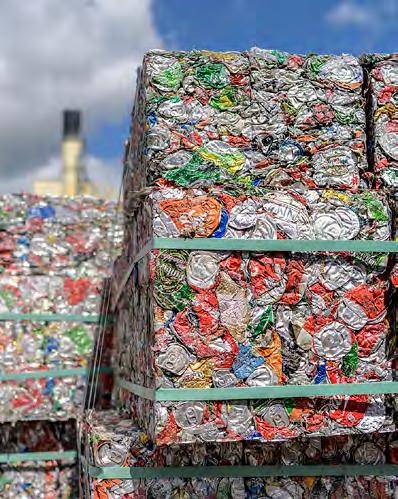
Lastly, whilst public understanding of recycling as well as recycling technology have markedly improved, there are still challenges in addressing so called ‘confusing’ packaging (i.e. those made of multiple different materials and often containing plastics). These too often end up in landfill or being incinerated even if the recycling infrastructure is available to process it, as people follow the mantra ‘if in doubt, throw it out.’
Opportunities
However, the future could be really bright for our industry. Demand is growing for sustainable packaging; brands recognise that recyclability is critical to delivering their own sustainability commitments to their customers. Our member’s focus is on maximising the end-of-life recycling rate of aluminium packaging, as it is the key lever to deliver lower-carbon packaging.
DRS and EPR reforms could deliver good environmental outcomes for aluminium packaging, building on the good foundations we have already achieved, so long as those systems are well-designed in a way that doesn’t create unintended consequences that can damage aluminium. Indeed, in other countries where these measures are in place already, aluminium thrives.
Why not here as well? Our “Aluminium Manifesto: A World- Class Recycling System for the UK” lays out our industry vision for just such a future.


BRITISH
CONSTRUCTIONAL
ASSOCIATION; PROTECTING, ENHANCING AND PROMOTING
MEMBER COMPANIES WORKING IN THE CONSTRUCTION SECTOR
The British Constructional Steelwork Association (BCSA) has been representing the UK structural steel industry for over a century and the Republic of Ireland since 2006. Operating on a local, national and international level, BCSA strives to raise the profile of the sector and its member companies
The Constructional Steelwork Industry in Numbers:
▪ The constructional steelwork market is worth approx. £1.6 billion per year
▪ Circa 60,000 people are employed in the sector
▪ Demand for steel in the UK is 15 million tonnes a year
▪ The UK generates 13 million tonnes of scrap metal per year which is sold to companies abroad for reprocessing
BCSA RQSC Member companies, undertake the design, fabrication and erection of steelwork for all forms of construction in building and infrastructure, as well as Industry Members who supply materials, components and machinery.
It is the aim of the Association to influence and create a fair-trading environment for all the Members to help improve their profitability. They already contribute a large amount to the economy and local areas through the projects they undertake, local people employed, and social value added through environmental and community work; and we believe this can be increased.
On behalf of the industry and its Members, the BCSA is calling on the new Government, with their Manifesto which was launched last year, to make policy change in a number of areas to help us build a sustained world-class constructional steelwork industry. These include some of the greatest challenges we face as a sector, which can and should be easily supported by the Government.

have been a bone of contention for companies throughout the sector for years.
Steelwork contractors are often one of the first skilled trades on a project site. 3-5% of the overall project contract value is retained by the developer for defect rectification at the end of the project, which could be years after BCSA Members have completed their element of the work. This impacts cash flow and impedes companies being able to invest in increasing their capacity and output. For smaller businesses in the supply chain this can be very detrimental and have very negative consequences. The BCSA is calling on the Government to ensure that Project Bank Accounts are utilised on public projects and outlaw cash retentions on all projects to help spur growth snd
UK FIRST
was a Government mantra, especially leading up to Brexit, yet it appears that public project procurement policy is not supporting this. As a sector we have witnessed first hand structural steelwork contracts for HS2 being awarded to European and other International joint ventures. In 2022/2023, of the 38,612 tonnes of steelwork, only 56% of this was awarded to UK companies. As these are public projects, the BCSA believes this % ratio should be much higher, if not all the contracts awarded to UK companies. We have the capacity and competency to undertake the work, and by doing so the benefit to the UK economy will be far greater, as well as local social value chains. This requires a change to the Government’s Procurement Policy for public projects, as well as policing them throughout the supply chain.
FIT FOR PURPOSE APPRENTICESHIPS
are required to meet the growing skills gap to ensure companies have a sustainable workforce for the future. The constructional steelwork industry has seen a great disparity in educational providers funding for level 2 and level 3 apprenticeships, which has led to preference of the higher level being offered. Potential apprentices for the steelwork sector require the basic skills taught under level 2 schemes and then refined by in house courses when graduating to fulltime employment. Unless a level playing field is created with equal funding, then we will continue to see the skills gap increase.
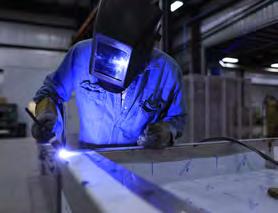
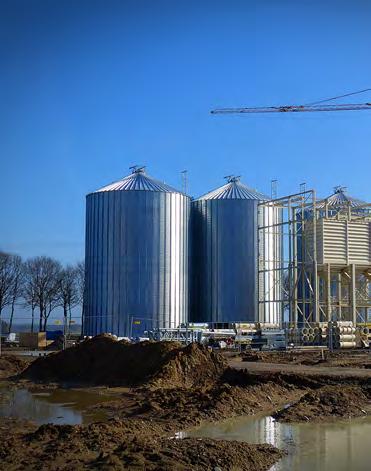
GOVERNMENTAL SUPPORT FOR UK STEELMAKERS
to decarbonise is paramount to keep a foundation industry alive, which is part of Britain’s heritage. Investment is required at a company and national level to enable this. Companies require financial support to implement new green technologies. Commitment to extend the national grid to power electric arc furnaces is required. As per our European neighbours, subsidised electricity for steelmakers will also make them more competitive. Without this, we may lose an important industry in this country and more steel will have to be procured from overseas.
The BCSA believes that with dedicated commitment to invest in these areas to support the constructional steelwork sector, the returns will be exponential as companies will have more business opportunities, new jobs will be created, new skills fostered, which will increase the resilience and capability of the industry.
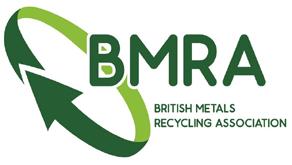
Like just about every industry in the UK, the metals recycling sector has been in a state of flux over the past few years. Brexit, COVID-19 and the war in Ukraine have all had an impact.
Despite warnings to Government, Brexit left us with a labour and skills shortage. Prior to Brexit, many general operatives hailed from Eastern Europe, but the nature of the job meant that they did not qualify for the pointsbased immigration system. Many of our HGV drivers found the delays and difficulties at outbound ports meant they would be better placed working within the European Union. Despite assertions from the Home Office that we would fill these roles with home-grown talent, this has not come to pass, and we are still hampered by shortages of suitable replacements.
When COVID-19 hit, we were recognised as a key industry and so were able to continue operating. With large numbers of householders at home on furlough, we did see them use the time to engage in a lot of DIY and, with nowhere to spend their money, they bought new TVs and white goods. This meant we continued to see volumes coming through the gates. This was followed by a post-lock down mini boom where there was plenty of crap and the prices were healthy. Now, the war in Ukraine, the cost of energy and inflation, has led to uncertainty amongst householders and this has meant volumes have withered and prices have dropped.
When it comes to the cost of energy, no one in the UK Metal industry is immune from its impact. The lack of serious Government intervention is making it close to impossible for some of our colleagues such as those in the steel industry to compete against even close neighbours in Germany and France whose governments are throwing everything but the kitchen sink at their domestic steel industry.
The UK metals recycling sector currently fulfils all the domestic needs for scrap. As we meet UK demand, we export around 80% of arisings. We would, however, welcome Government intervention to support the UK steel industry’s transition to net zero by moving to electric arc furnaces (EAFs) which use more scrap. Indeed, we are already a key part of helping the steel industry – and all other metals smelted in the UK – decarbonise.Recycling metal produces 80% less CO2 than production from raw materials. Recycling steel uses 70% less energy than mining and refining virgin ore.

We are facing our own challenges to move away from fossil fuels. Firstly, many of the current electrified plant and equipment is not safe to use in the harsh environs of a metal recycling yard not least because they often come with a tether or power umbilical. They can also come at a significant cost. Secondly, some 30% of sites are either not connected to the Grid or cannot draw enough power to enable them to make the transition.Government grants such as the Industrial Energy Transformation Fund make the application process so onerous that many SMEs are simply unable to apply.
Given our impact on UKPLC and our place in helping the metals industry decarbonise, surely this should not be the case? If nothing else, the war in Ukraine has shown just how much we rely on overseas metal smelters and producers. Surely, we should be fighting to breathe new life into the UK metals sector?
Of course, what we would need for this to truly happen is a domestic market for our metals. We need the Government to energise UKPLC. It needs to place engineering and manufacturing firmly back at the heart of its industrial strategy and reclaim its position on the world stage as a ‘centre for excellence’. The drive towards increasing university places has meant traditional skills that were so strongly linked to apprenticeships have been lost. Our bid to transition to a world-beating service economy hasn’t really come to fruition. We need to recognise this and go back to what we are really good at… making things.
This would also offer further opportunities for the Government to embrace green and dare we say it, local, procurement policies. For example, they should be mandating the use of materials containing recycled content in national infrastructure projects.
Finally, the UK metals recycling industry needs a level playing field in which to do business. We continue to be faced with businesses operating without a scrap metal dealer licence and, often, without the correct environmental authorisation. Local Authorities and police services are simply not enforcing the Scrap Metal Dealers Act. Local Authorities openly say that in the face of the thousands of taxi and alcohol licences they are faced with, scrap metal dealers are an add-on and not a priority.
Some sites are also not operating with environmental best practice in mind. Many are currently operating under a T9 exemption, which is free and which means, being unpermitted, they are not ordinarily regulated by the Environment Agency. The removal of the T9 exemption next year, may make things worse as the cost for even the simplestenvironmental permit is set to be over £2,600. While the Environment Agency is looking to secure funding to ensure those with a T9 make the
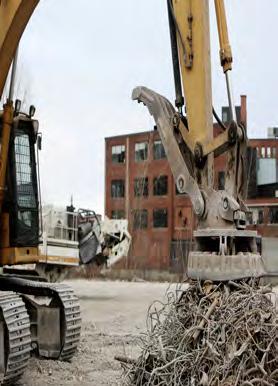
transition, it will be a big piece of work which will take some time. In the meantime, these operators will continue to operate in an illegal manner unchecked.


The British Stainless Steel Association is a member funded trade association, representing businesses and stakeholders involved in the stainless steel industry from raw material extraction, manufacture, distribution, fabrication, surface treatments, installation, to end of life recycling.
The BSSA is located in the heart of Sheffield, Steel City and the birth place of stainless steel in 1913.
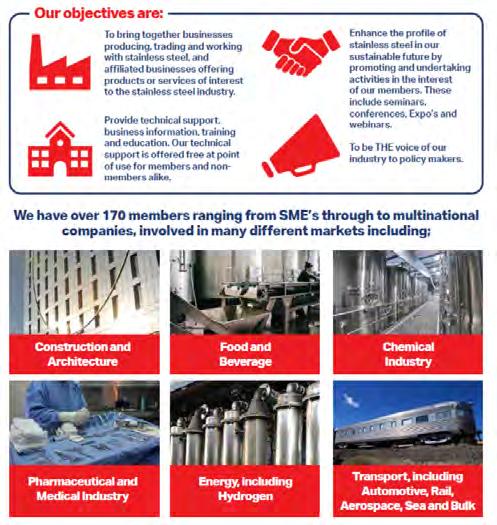
What are stainless steels?
Stainless steels are a small but critical part of the wider steel family. Stainless steels are steels that contain a minimum of 10.5% chromium and have a maximum carbon content of 1.2%. It is the chromium that make stainless steels special. The addition of this alloying element gives stainless steels superior corrosion resistance over many other products. Corrosion resistance is the main reason to use stainless steels, but they have other benefits that influence why they are selected. These include its aesthetic appearance, the ability to withstand temperatures ranging from cryogenic up to service temperatures in excess of 1000°C, the hygienic properties and the longevity of correctly selected materials in many environments. Over
Why is stainless steel so important to the UK economy?
The UK was the birth place of stainless steels and we are still a proud producer, with the biggest meltshop now being Marcegaglia’s facility in Sheffield. Since the aquesition by Marcegaglia in January 2023 they have committed to substancially increase the output from 250,000 tonnes per year of billets and slabs and have already created over 60 new jobs on the site.
In the UK we use approximately 250,000 tonnes per year of stainless steels in many different product forms. This is approximately 3% of the total consumption of all steels used here. Therefore, stainless steels are a relatively small, but critical contributor to UK industry. Stainless steels are used in food and beverage preparation, chemical and pharmaceuical industries, medical applications, and renewable energies to name a few. Without stainless steels many of our industries would not exist, and certainly would not be as safe, long lasting or sustainable as they are today.
Stainless steels are critical in our transition to Net Zero. Without the physical and mechanical properties of stainless steels many new green industries and technical advancements would not be possible. Stainless steels are paramount in hydrogen production and storage, carbon capture and tidal power generation to give some examples of new industry applications. Stainless steels are essential for the nuclear industry, whether that is development of Small Modular Reactors (SMR’s) or in the decommissioning of aging nuclear power stations and storage of radioactive waste.
200 commercially available stainless steels are obtainable in many different product forms that can assist industries to overcome problems in a sustainable and effective way.
Stainless steel are 100% recyclable and indeed their high value encourages recycling. This, in turn, lessens the environmental impact of stainless steels by reducing both the need for new raw materials and the energy that their production uses. For example, the amount of stainless steel scrap currently being used reduces the energy required for stainless steel manufacture by around one-third over using 100% new raw materials.
Stainless steels are the “safe” choice of material for medical applications and for our food and beverage industries. Stainless steels are easy to keep clean for all critical applications as they have a high resistance to cleaning agents, disinfectants and sterilising agents. In the food and beverage industry stainless steel plays a vital role in the production and processing of many of our food cupboard staples. For over 70 years stainless steels have been used in the preparation, processing and transport of food products to ensure a high standard of quality. They do not affect the taste or smell of food and drink. In the medical industry we use stainless steels throughout hospitals and even as a material for medical implants.
Without stainless steels it would be impossible to develop many of the industries that the UK needs for our Net Zero ambitions whilst safeguarding our food and beverage production and protecting our health.
The UK needs to support our stainless steel production and to ensure we have a robust supply chain. We have to develop career programmes that encourage talented individuals to join and remain within our industry and to increase the understanding of correct material selection for the application. The BSSA is committed to the development of our industry, the training of our people, promoting the benefits of this incredible material and ensuring the voice of our industry is heard.
For further information on the BSSA, our training and development programmes, or the stainless steel industry please contact us via the following link: https://bssa.org.uk/
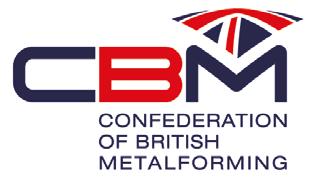

STEVE MORLEY President
GERALDINE BOLTON Chief Executive
Providing a strong voice for the metals sector

The metals sector is again holding its breath. Cautious optimism reigns amongst our members, with order books heading in the right direction and inflationary/energy prices easing slightly.
Management teams across the UK are now waiting to see what Sir Keir Starmer and his cabinet will do to help support our vital sector, a sector that is responsible for 11,000 companies and responsible for directly and indirectly employing nearly one million people.
A large swathe of this critical supply chain is small to medium-sized manufacturers and one of the key messages we will deliver to the new government is to ensure that the SME voice is heard and that the right levels of funding and support is directed in their direction.
The Confederation of British Metalforming (CBM), which represents over 200 members, employing 70,000 employees and generating sales in excess of £40 Billion. They are involved in the manufacturer of fasteners, forgings and pressings, cold-rolled, sheet metal products and Aluminium manufacture, has reiterated its desire to bring in a long-term Industry Strategy.
“This should both play to the UK strengths and acknowledge the challenges we face,” explained Geraldine Bolton, CEO of the CBM.
“Ideally, we’d like to see something that is crossparty or has a Royal Charter that ensures longevity regardless of the political persuasion. Part of this new approach could be a dedicated Minister for Manufacturing.
“The latter is a campaign we have added our voice to and could be an early win if Labour wanted to show a willingness to place new importance on a sector that drives innovation, supports GDP and creates highskilled jobs. There must, however, be a firm desire to look past the B5 lobbying groups and give SMEs their voice.”
She went on to add: “Leaving the EU continues to have a negative effect on our sector and brings widespread disruption to UK manufacturing, yet not one party in the lead-up put forward a potential resolution. This is something that Keir Starmer needs to address urgently.”
CBM President Steve Morley is in agreement. He spends most of his working days travelling the country and globe lobbying government on a host of issues and regulation that are squeezing more than 200 member companies.
“Skills…skills…skills, I can’t shout it loudly enough,” he went on to add. “We urgently need a review of the Apprenticeship Levy and how funding in this pot can be spent. There needs to be more creativity and an ability to allow manufacturers to spend it on different types of technical courses that they specifically need and will create the employees they require.
“There is also an argument that the current funding structure doesn’t encourage training providers to support Level 2 apprentices, which traditionally is what we call Foundation Level. We’re all for upskilling, but we’re missing an important rung of the engineering ladder.”
Whilst there are definitely challenges for the metal sector, there are also several opportunities. The CBM team has undertaken more than 30 company visits so far this year and have encountered stories of optimism, innovation and strong order books.
Suppliers into the aerospace sector have reported a surge to higher volumes than seen before Covid-19, suggesting that air cargo and air passenger levels have returned and could soon be eclipsing 2020 levels.
There’s a strong supply chain serving this industry in the West Midlands and the increase in widebody aeroplane production could generate even more revenue once it trickles down the tiers.
Members also enjoy supplying into medical, nuclear, construction and the historical heavyweight market that is automotive.
Steve, who has headed up several auto suppliers before joining the Confederation of British Metalforming, continued: “In the first week of July, the SMMT announced that we had passed the 1 million production level for vehicles in the UK, which is good news for suppliers and shows demand is slightly up on previous years.
“However, our companies are driven by the big OEMs and what they are doing. Many of them were ambitious and made the move to electric cars in view of the 2030 ban, but some now are pulling back on investments due to the government pushing this back five years ago.
“This creates a great deal of uncertainty, and our members aren’t shielded from these decisions in Whitehall. There are certainly still opportunities in this market and, I do genuinely believe, that fortune favours the brave in this instance – the move will happen and we should try to position ourselves to be ahead of the game.”
Successful year
The last twelve months have been a successful period for the Confederation of British Metalforming.
Its increasingly important role in being the voice of SMEs has continued at pace and played a key role in helping its members prepare for changes in the marketplace. The impact of EU sanctions on Russia, especially pressing if you have steel imports/exports, was the first ‘win’, with CBM members being given advance warning of their impact and the measures they can take to offset some of the issues.
The increased steel safeguarding quota has remained in place, whilst the organisation’s work on the Energy Taskforce helped to hold Ofgem to account.
“Our next big priority is supporting our businesses with CBAM, or Carbon Border Adjustment Mechanism to give the full title,” added Steve.
“The EU’s measure is already in place and is designed as a tool to put a fair price on the carbon emitted during the production of carbon intensive goods that are entering the EU. This has the potential to be a massive cost for manufacturers and the UK will soon be following by introducing its own CBAM over the next 12 months.”
2024 also saw the CBM recruit its largest ever member, with JLR becoming the latest company to join the organisation as the car maker looks to explore even

stronger relationships with the downstream supply chain.
The company, which has five design centres and manu facturing plants in the UK, is planning to tap into the organisation’s membership base, with early plans in place to explore a series of exclusive events designed to build better communication and increased collaboration.
These sessions will be co-ordinated by the CBM and will address topical issues and opportunities for growth, especially around the move towards cleaner mobility and future model introductions.
“This is a massive moment for everyone connected with the fasteners, forgings, pressings, cold-rolled and sheet metal products sector, a sector so critical to the domestic and global automotive industry,” explained Geraldine.
“We are thrilled to be working with JLR, one of the most iconic brands in the UK and one of the most important employers in the West Midlands.
“Our aim is to deliver real value on a host of industry issues and new legislation, as well as helping shape new relationships with the supply chain. It’s a moment in our history that should deliver benefits for everyone involved with our organisation.
The CBM is the UK’s only specialist manufacturers’ organisation for experts involved in metalforming.
Operating from the National Manufacturing Centre in West Bromwich, it represents over 200 manufacturing companies across the UK, covering sheet metal, fasteners, forging, cold head forging and cold rolled sections. Together, they employ 70,000 people and boast a combined turnover of £40billion.
For more information, please visit: thecbm.co.uk


A net zero future for metal castings – precision engineered products to support the UK economy
The UK castings industry underpins the strategic national supply chains needed to support the UK’s transition to a lower carbon economy, whilst also playing a key role in the circular economy for metals - the industry routinely uses secondary raw materials to help lower final product carbon footprint.
UK foundries know how to compete internationally and can be part of the solution, delivering lower carbon components (due to the relatively lower embedded carbon derived from the use of secondary raw materials) to strategic supply chains, such as aerospace, automotive, defence, marine, medical and power generation, including components needed for greener technologies.
No modern economy can survive without castings but the UK industry needs support to transition and sustain the industry here.
Support for UK manufacturing is required for the low carbon transition and to avoid carbon leakage.
As the sector seeks to optimise the opportunities to manufacture lower carbon products in the UK, some key challenges for the casting sector include:
• Development of commercially attractive zero-carbon alternatives to the use of fossil gas in aluminium melting, pre-heating ladles for metal holding and transferring, firing of the refractory shells used in investment casting and heat treatment.
• Efficient methods for recovery and re-use of waste heat including heat to generate electricity.
• Digital monitoring and control (optimisation) of energy use
• Cost-effective applications for new energy vectors including plasma and SMRs.
• Sustainability of raw materials and re-use of biproducts.
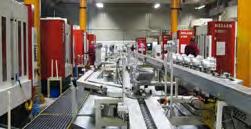
UK Government needs to create a stable policy environment that focuses on reforming energy markets and providing clean energy at a globally competitive price, with rapid and sustained investment in the UK energy infrastructure for electrification.
The provision of incentives for capital investment in zero carbon furnaces and production equipment that are as accessible for companies of all sizes. Enabling planning reforms would allow sites to invest in new production facilities, to enable companies to optimise and maximise the benefits of on-site energy generation.
UK trade policies should support customer demand for low carbon products for global markets, to prevent substitution by higher carbon, less recyclable alternatives. Making things locally makes economic sense – the sector has the opportunity to grow significantly.
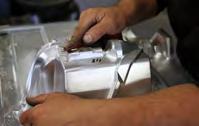
A competitive industry needs skilled employees
The continued competitiveness of our sector requires there to be a skills strategy that enables companies to source relevant training, something that is particularly challenging for niche sectors with specialist skills requirements. We ask for more flexibility around the use of the apprenticeship levy to upskill employees. Providing specialist skills requires specialist equipment and tutors - most providers don’t have these, particularly for smaller learner cohorts – this is a real challenge for our industry.
What we make and why we matter
UK foundries specialise in near-net-shape, precision finished components and assemblies in all sizes, volumes, cast weights, metal alloys & processes, for UK & international markets, with production facilities in the UK, melting metal in furnaces at temperatures ranging from 700-200oC. Most of our foundries already use electricity for melting which, if from sustainable sources, means an even lower carbon footprint for the resulting components. But there is still a requirement for natural gas and the transition to alternative fuels will be challenging, with capital investment cycles for foundries typically being relatively long.
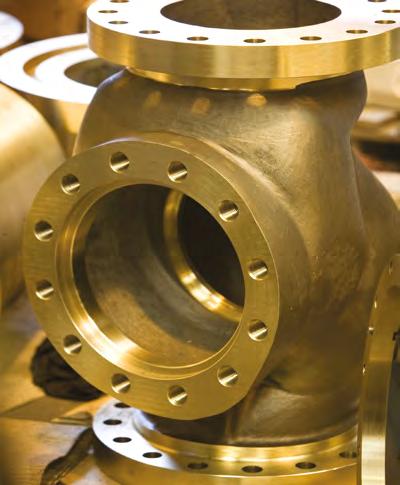
A partnership approach with a significant economic and carbon dividend.

By working together, the trend of the industry drifting offshore can be reversed and inward investment encouraged, supporting the transition to a vibrant, net zero foundry sector as part of national industrial decarbonisation. The industry wants to be part of the solution for the UK, making use of recycled metal to produce locally sourced components and leading the way in the supply of lower carbon, cast metal components and finished products.



Galvanizers Association is a leading voice for circular construction, committed to transforming the perception of galvanized steel, and revolutionizing the way society values and utilizes materials. By promoting the immense potential of galvanized steel, not just as a durable and reliable choice, but also as a valuable part of a sustainable future, Galvanizers Association is helping the country transition to a circular tomorrow.
We are dedicated to creating a truly equitable society and to the regeneration of spaces where communities live, play and work, so that everyone can access sustainable services and a healthy, built environment. What we are committed to doing to make our vision happen
For over 80 years Galvanizers Association has supported professionals in need of expert corrosion advice, and we will continue this valuable work for the generations of design and construction professionals to come. We believe that only by protecting what we design, make and construct will we establish the circular economy that our world so urgently needs. Our mission is to show the world
SUSTAINABILITY AND THE CIRCULAR ECONOMY
Hot dip galvanized steel structures and components are ideal circular materials. The galvanizing industry in the UK and Ireland welcomes the increasing focus on the creation of a circular economy and embraces flexible design for durability, deconstruction, and disassembly. Galvanized steel readily facilitates the reuse, re-manufacturing or recovery of materials.

how, by extending the lifecycle of metal through hot dip galvanizing, we could reduce waste, conserve resources, and minimize the environmental footprint for every built project around the globe.
We are the voice of an industry focused on adaptable solutions that can be reused, refabricated and which will endure for generations; flexible options found throughout society offering endless potential and multiple lifecycle evolutions. We are proud that the inspiring, technical advice we offer informs some of the most innovative projects being built and fabricated today and help pioneer methods to maximize corrosion resistance, improve aesthetic appeal, and optimize energy efficiency.
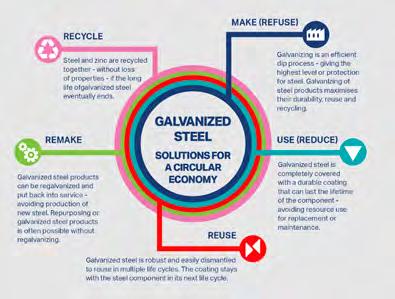
If a material system was specially designed for the circular economy, hot dip galvanizing would be a perfect example:
▪ Hot dip galvanizing of steel products after fabrication delivers the highest levels of corrosion protection – the steel structure will often achieve its design life with no maintenance.
▪ The galvanized coating can follow the steel structure through multiple cycles of reuse.
▪ Galvanized steel components that have reached the end of their design life, or are uninstalled for any other reason, can be re-galvanized and returned to the original use.
▪ If the re-use cycles come to an end, both steel and zinc are recycled together in the well-established steel recycling processes with the zinc being returned, without loss of properties, to zinc production plants and eventually back into into the galvanizing process.
▪ Galvanized coatings are bonded to the steel – allowing the steel product to be reused along with the original coating without need for recoating.

NET ZERO

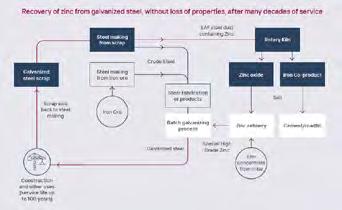
William Smith, Executive Director, Galvanizers Association
"Hot dip galvanizing makes a critical and significant contribution to the durability of the nation's steel infrastructure, extending the life of this valuable asset for many decades assisting the transition to a more sustainable, low carbon, circular economy."
Businesses within the industry are committed partners in making the transition to a sustainable, net zero, circular economy. Companies are actively engaged in the assessment of their existing carbon footprint, goal setting and planning for reductions in carbon going forward, working with their supply chain partners as necessary.
GOVERNMENT POLICY
The prevailing operating environment will have an impact on the opportunities that emerge allowing industry to meet climate change challenges. In this regard national, regional and global markets, heavily influenced by individual Governmental policies, have a critical role to play in providing the right conditions within which companies can develop and deliver the innovative solutions needed to meet broader long-term national goals.
In order to maximise the benefits of the use of hot dip galvanized steel in fulfilling the national goal for action on climate change, delivering a positive transition to a more circular, sustainable, net zero economy, Government must however address a number of key issues as a matter of urgency.
Consistent and stable long-term policy - it is important that businesses have a more stable long term regulatory and economic framework within which companies can plan and execute development and investment initiatives. The political cycle is too short and policy changes too frequent to support adequate long-term planning.
Skills - The Apprenticeship Levy needs to be adjusted and made more flexible in application for use by largely SMEbased businesses, with key or niche skills requirements (evidenced by many in the metals sector). Broader support and higher levels of funding for Level II and Level III apprenticeships is required to maintain a healthy foundation industry. For metal finishing in general - and hot dip galvanizing in particular - the UK Immigration System of classification needs adjusting to recognise the skill requirements of personnel seeking to join the industry enabling industry to fill vacancies where local supply is not possible.
Energy- As for most metals-related businesses, energy costs remain stubbornly high for the sector. UK businesses pay more for energy than many of their competitors in continental Europe and beyond. This undermines the competitiveness of UK industry.
Public procurement - Contracts awarded for projects of public interest should recognize the holistic benefits of local supply and focus much more on inclusion of contributions from manufacturing and construction sourced from within the UK. Too many of recent high-profile projects have included Joint Venture partnerships where the finance / insurance was sourced from within the UK but much of the manufacturing / construction elements were allocated from overseas sources.
For more information, please visit: www.galvanizing.org.uk


The Metal Packaging Manufacturers Association is the recognised and unified voice of the metal packaging industry to gover nment, NGOs and broader stakeholders, bringing influence to achieve favourable policy and activity outcomes for the sector. Through advocacy and education, the Association’s promotional and public relations activities highlight the unique sustainability and performance benefits of metal packaging, ensuring these are widely understood and valued. These benefits are presented across three key promotional platforms:
cannedfood.co.uk

canmakers.co.uk

doitwithcans.co.uk
The metal packaging landscape
Across Europe (EU 27, Norway, Switzerland and UK) some 98bn units are produced for the beverage, food, health & beauty, household and industrial markets, and around 14 7bn units in the UK
Given that metal can be recycled over and over again, with suitable collection, near 100% recycling rates for metal packaging are possible.
As a permanently available material – one whose inherent properties do not change during use, despite repeated recycling into new products - metal packaging makes a real and positive contribution to the circular economy When a metal product reaches the end of its useful life, the material is never lost Through recycling over and over in a material-to-material loop, its value is retained forever, making it available today and for future generations
MPMA Membership
Full membership is available to those companies in the UK involved in the production and supply of light metal containers and closures
Associate membership is available to companies supplying materials, services, or equipment to metal packaging manufacturers, or who are stockists or suppliers to the UK market Associate members have the opportunity to network with full members at association meetings and events and benefit from MPMA’s broad metal and packaging expertise and contribution to the packaging legislative process, webinars, and industry events
In the UK 77% of steel packaging and 68% of all aluminium packaging sold in the UK is recycled.
Across Europe 80.5% of steel packaging is recycled and nearly 90% of the aluminium packaging consumed in the UK is recycled within Europe.
It is estimated that 75% of all metal ever produced in the world is still available for use.
With recycled steel around 70% of the energy is saved compared to steel made from primary ore.
With recycled aluminium around 95% of the energy is saved compared to primary ore.
Canned food lasts way longer than food in most packaging types locking in nutrients with little need for preservatives and, as an ambient pack, saves energy too – no refrigeration needed in transit, in-store or at home
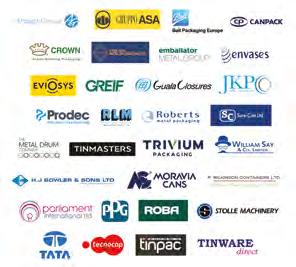
Seven opportunities for the new Government: a strategy to build the UK's steel industry
The new Government now has a monumental opportunity to differentiate itself, building on its ambition to develop the UK's steel sector with £2.5bn from the National Wealth Fund to deliver competitiveness and futureproof our steel sector. UK Steel put the steel agenda front and centre of the political discussion and is campaigning on seven key opportunities to secure steel for our nation.
1. Lowest industrial electricity prices in Europe
2. Steel scrap competitiveness and recycling capability
3. Decarbonisation through Government-industry partnership
4. Investment in innovation
5. UK CBAM by 2026
6. Robust trade defence
7. Leverage power of public procurement
Despite being a strategic sector, central to the UK’s economic strength and resilience, the UK steel industry is battling sliding competitiveness and increasing imports. Steel must be the backbone of a strong and successful British economy. In 2023, UK steel fed £1.8 billion into the economy and an added £2.4 billion through supply chains, as well as £3.4 billion to the UK’s balance of trade. Our industry is critical to our nation’s future, and we should not be importing nearly 70% of the steel we use in the UK from abroad.
Levelling the playing field and boosting competitiveness are the cornerstones of the sector’s success. Addressing this will uplift regional economic equality where it is most needed, providing well-paid, highly skilled jobs and bringing investment in Wales, the Midlands, South Yorkshire, and the North East of the UK.
Moving the dial on energy, environment and climate change
UK Steel was the leading voice in securing the UK Carbon Border Adjustment Mechanism policy, covering steel, among other sectors. We have published a UK CBAM framework paper which pushed Treasury to guarantee a robust policy with minimal risk of circumvention, strong carbon leakage protection, and alignment with the EU equivalent mechanism for frictionless trade.
UK Steel issued a comprehensive briefing on Electric Arc Furnaces and has recommended a number of policies in our steel scrap report to promote the best use of the UK’s
10 million tonnes (Mt) of steel scrap resources for EAFs. We campaigned for government to manage steel scrap exports, develop cross-sectoral working and support funding for research and innovation. This year, the British Industrial Supercharger was also implemented in April 2024. The initiation date was brought forward following work by UK Steel, significantly lowering electricity prices for the industry.
Looking ahead
We need the lowest industrial electricity prices in Europe
Electricity consumption can represent up to 180% of UK steel producers’ Gross Value Added (GVA). UK Steel analysis found that UK producers faced average wholesale prices of almost £66 per megawatt hour (MWh) between April to June 2024 compared to France’s £27/MWh and Spain’s £28/MWh - more than double the cost of key competitors. Additionally, electricity network charges are 10 times higher than in France. The future of the UK’s steel industry depends on its ability to decarbonise, which is contingent on competitive electricity prices. Two changes are needed: parity with competitors on network charges and wholesale electricity market reform.
Call for steel scrap competitiveness and recycling capability
Steel scrap is a strategic material and will be critical to the steel sector’s Net Zero future. By 2030, UK scrap demand could increase by 70% and global demand by 30%, and this will continue to accelerate into 2050. Currently 80% of our scrap is exported, and the UK should look to regulate its exports of scrap to uphold environmental standards, enable fair competition and incentivise domestic processing.

Stepping
up decarbonisation through Governmentindustry partnership
The steel industry is committed to reducing 80% of emissions by 2035 and Net Zero steel production by 2050. Our sector wants to work hand-in-glove with Government to achieve these aims. Investment is needed in wide plate steelmaking capability to make the most of the nation’s Net Zero transition, for wind towers, floating wind and the wider offshore wind supply chain.
UK CBAM by 2026
A UK Carbon Border Adjustment Mechanism is now proposed to be implemented in 2027, a year later than when the EU’s CBAM takes effect, exposing our market to trade diversion of high-emission steel. UK Steel has been calling for this date to be brought forward. We estimate that 23Mt of steel currently imported into the EU would be at risk of diversion to other open markets when the EU’s CBAM is put in place. If even a fraction of this material was diverted to the UK market when facing EU CBAM costs, it would cause serious injury to UK producers and directly undermine any efforts to decarbonise as the sector would be undercut by highemissions steel imports not subject to carbon costs.
Increase investment in innovation
The UK boasts some of the best research and innovation expertise, which we must capitalise upon and grasp the opportunity to become global leaders in green steelmaking.
Turning the tide for trade and steel procurement
UK Steel has led the way to push government to continue 15 categories of steel safeguards, working closely with the Trade Remedies Authority and officials to secure this major policy which was announced in June. Global excess capacity is fast approaching unsustainable levels, fuelled by state subsidies and mostly from high-emission blast furnaces. UK Steel is exploring trade policy solutions for 2026 when the steel safeguards expire.
Steel procurement is another significant area of our work, and UK Steel has collaborated with officials to publish a steel pipeline and purchase report on government steel procurement and issued a paper on improving steel supply chain collaboration with the Ministry of Defence. Major buyers across renewables, hydrogen, and carbon capture are working with UK Steel to identify opportunities to buy more local content and understand capability and capacity for substantial future projects such as offshore wind.
Looking ahead
Time to implement robust trade defence
UK steel safeguards will expire in 2026 and cannot be renewed under World Trade Organisation rules. The UK must be ready to take a stronger stance on trade remedies, making them more accessible to industry, developing a clear position towards non-market economies and forming alliances with like-minded countries to develop new trade remedies tools that are fit for purpose.
We must leverage the power of public procurement
The Government has a hugely powerful tool at its disposal to bolster UK industry and supply chains, while at the same time maximising the social, economic and environmental benefits of public expenditure. New UK Steel analysis found that the current steel order book, published prior to the election in April 2024, may spend over £1.5 billion on steel bought from abroad. Over the next decade, existing government figures show a steel order book spend worth an estimated £4.3 billion in public procurement. However, the latest data confirms that only 66% of this steel is purchased from UK steelmakers. If this trend continues, the UK is potentially missing out on at least £2 billion of cumulative direct and indirect GVA. The new Government's mission-led agenda aims to elevate the prosperity of British business, and we can now make the most of the nation's steelmaking talents and companies by buying more UK-made steel.
UK Steel is the trade association for the UK steel industry and proudly champions the country’s steel manufacturers.


TWI is a membership based organisation that supports companies and individuals alike by providing authoritative and impartial expert advice, knowhow and safety assurance through engineering, materials and joining technologies.
Our experts work across industry to help our Members design, create and operate the best products possible. TWI is descended from the British Welding Research Association (BWRA), but have grown to encompass more than welding, including innovation, knowledge transfer and problem resolution across all aspects of welding, joining, surface engineering, inspection and whole-life integrity management.
We have grown to become one of the world’s foremost independent research and technology organisations, delivering engineering consultancy services and knowhow. Because we are independent and impartial, our Members trust us to deliver the best solution for them on a case-by-case basis, drawing upon our knowledge and expertise from across industry.
Our integrated approach to joining, inspection and material implementation embraces everything from research and development, specification and prototyping, to commissioning, installation and training, with services including:
• Accelerate uptake / de-risk introduction of new technology for products or assets
• Manufacturing process acquisition support programmes
• Access to state-of-the-art welding, joining, coating, additive and inspection systems
• Process technology innovation
• Design and engineering for optimum performance
• Design-material-process review and optimisation
• Standard and bespoke testing facilities – fracture, fatigue, corrosion, analysis and Hydrogen
• Assistance to improve your existing processes and production
• Product and process review, troubleshooting and optimisation
• Auditing and certification
• Establish fitness for service of your structures and assets
• Engineering critical assessment, (risk-based) inspection and condition/structural health monitoring
• Understand causes and mitigate failures
• Rapid failure analysis
• Repair procedure development and application
• Expert witness/litigation support
• Understanding and application of codes and standards
• Expertise in national and international standards
• Presence on code/standard governing bodies
• Staff training and development
• Multiple training programmes and certified courses
• Bespoke training by technology providers

• Professional career progression (via The Welding Institute)
We are proud of our long association with UKMC, and look forward to supporting the strategic ambitions of the UK metals sector, both technically and commercially.
For more information, please visit: www.twi-global.com
Lord Redesdale on the 2024 State of the UK Metals Industry Report
Since its inception in 2022, UK Metals Expo has tripled in size, solidifying its position as the premier event uniting the entire metals supply chain with the engineering and manufacturing community.
Join us from 11-12 September 2024 at the NEC Birmingham for a free-to-attend exhibition and conference, showcasing a wide range of innovative products, services, and interactive sessions led by top experts.
From primary metal manufacturing to supply chain management, design, metal processing, metalworking, fabrication, machinery, surface finishing, and recycling, UK Metals Expo serves as a comprehensive destination for professionals searching for solutions to their challenges.
Whether you procure, design, shape, manufacture, fabricate, or work with metals, if they are part of your world, you should attend UK Metals Expo.
With 300 exhibitors, a seminar programme across 4 stages, 100+ speakers, and a vibrant community of 10,000+ participants, UK Metals Expo is the ultimate platform to:
• Connect with fellow professionals, benchmark solutions and source new suppliers.
• Explore innovation, gain insights into emerging trends and sustainable practices.
• Foster collaboration and enhance your expertise.
• Unlock fresh business opportunities across the entire metals supply chain.
The show aligns perfectly with the UK’s pursuit of Net Zero, relying on advanced materials, manufacturing excellence, and engineering innovation. A robust domestic metals supply chain is pivotal in achieving Net Zero objectives, driving energy-efficient production, nurturing circular economy practices, and propelling sustainable advancements across construction, transport, aerospace, defence, energy, and manufacturing.
UK Metals Expo aims to foster collaborations and provide clear pathways to success. Our close partnership with the UK Metals Council and its 13 affiliated trade associations serves as a cornerstone in leveraging collective wisdom and expertise across the entire supply chain. This strategic alliance empowers us to confront challenges head-on and lead the way in pioneering innovative solutions.
Developing strategic partnerships and global networks remains critical to unlocking the immense potential of the UK metals industry. As a catalyst for invaluable collaborations that transcend geographical boundaries, the expo serves as a gateway to new markets and customers, thereby extending the industry’s impact.
ME TALS EXPO

As we convene at UK Metals Expo 2024, we find ourselves at a pivotal moment for our country and the steel industry. The UK is not only the birthplace of the industrial revolution; it’s also where the next chapter of the industry is being written. With a new government comes new hopes, new directions, and new opportunities. The recent announcement by Tata Steel and British Steel regarding the UK’s shift from blast to electric arc furnaces is integral to this transformation.
Accelerating our efforts towards decarbonisation and achieving net-zero emissions is not merely a goal but an imperative. This transition highlights the urgent need for a robust industrial strategy that will shape the future of the UK metals supply chain and profoundly impact the engineering and manufacturing sectors. Together, we are engaging in dialogues that will define this future.
The UK confronts significant challenges and opportunities in its journey to achieve net-zero emissions through advanced materials and manufacturing. A thriving domestic metals sector is fundamental to our success. This event will facilitate collaborations, unveil new initiatives, and explore solutions.
I look forward to meeting you this September.
Lord Redesdale


